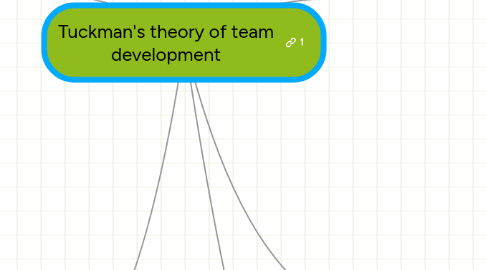
1. Dr Bruce Tuckman
1.1. Introduction to Tuckman's theory
1.1.1. Storming
1.1.2. Norming
1.1.3. Forming
1.1.4. Performing
1.1.5. Adjourning
2. Negatives
2.1. Forming: Role agreement
2.2. Storming: Conflict
2.3. Performance: stuck in a rut
3. Learners
3.1. Storming stress
3.1.1. inconsistency of intstructions
3.1.1.1. erratic discipline
3.1.1.1.1. Carlson, E. A., Jacobvitz, D. & Sroufe, L. A., 1995. A developmental investigation of inattentiveness and hyperactivity. Child Development, 66(1), pp. 37-54.
3.1.1.1.2. long + short term effects (e.g. ADHD)
3.1.1.1.3. Jacobvitz, D. & Sroufe, A. L., 1987. The early caregiver-child relationship and attention-deficit disorder with hyperactivity in kindergarten: a prospective study. Child Development, 58(6), pp. 488-495.
3.1.2. concentration levels
3.2. Social learning theory
3.2.1. role modelling of interpersonal skills
3.2.2. conflict
3.2.3. trust
3.2.3.1. building
3.3. Clear roles of adults
3.3.1. focus
3.3.2. consistency
3.3.3. security
3.4. Quality improvement
3.4.1. learning experiences
3.4.2. too much change?
4. Tuckmans theory in relation to practice.
4.1. Theory can be recognised through the 5 stages of Tuckman's theory
4.2. Stage 1: Forming
4.2.1. Team come together
4.2.2. Team will spend time bonding, planning and collecting information
4.3. Stage 2: Storming
4.3.1. Team will decide on the task
4.3.2. Form relationships
4.3.3. Confrontation and lack of communication
4.4. Stage 3: Norming
4.4.1. Team will understand and recognise each other's abilities
4.4.2. Leader gives more responsibility
4.5. Stage 4: Performing
4.5.1. Stage is rarely reached
4.5.2. Good communication
4.5.3. Task is complete successfully
4.6. Stage 5: Adjourning
4.6.1. Letting go of attachments and roles in the team
5. The positives of Tuckman's Theory
5.1. Norming : Start to appreciate colleagues strengths. Start to socialize together and ask each other for help and will become more committed to the team goal.
5.1.1. Teams are able to achieve more than they would as an individual.
5.1.2. When forming a team, first of all, most of the team are positive and polite and excited.
5.2. Performing: Work is carried out without friction and it will start to feel easier to be part of the team.
5.2.1. Being part of a team can be extremely rewarding.
5.2.2. Members of a team can feel pride for being chosen for a certain team.
